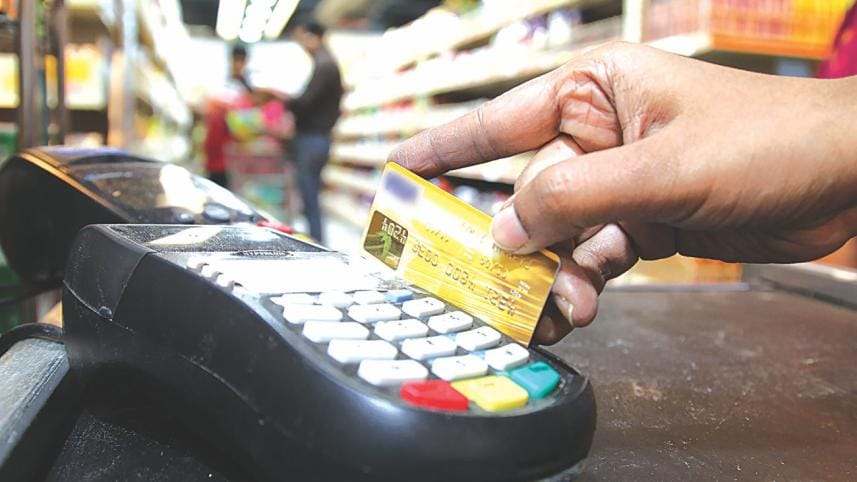Digital transactions surge, but cash is still king: experts

Bangladesh has made notable progress in digital financial transactions but remains far from becoming a cashless economy, experts said yesterday, calling for stronger policy support, improved infrastructure, and wider adoption to reduce reliance on physical currency.
"A cashless economy enhances efficiency, economic formalisation, financial inclusion, reduces costs, and improves global integration," said Debapriya Bhattacharya, distinguished fellow at the Centre for Policy Dialogue (CPD).
He made the remarks while delivering a keynote titled Regulatory Reforms & Policy Roadmap for a Cashless Bangladesh at the Cashless Bangladesh Summit 2025, jointly organised by the Institute of Cost and Management Accountants of Bangladesh (ICMAB) and Mastercard at the Sonargaon Hotel in Dhaka.
Bhattacharya highlighted that digital transactions promote transparency, curb corruption, expand the tax base, and offer citizens greater convenience and security.
In 2024, Mobile Financial Services (MFS) transactions reached Tk 17.37 trillion, nearly 50 percent of GDP, according to his presentation.
Overall, 84 percent of banking transactions are now digital, with 56 percent conducted online and 28 percent via MFS. About 47.8 percent of the population uses MFS wallets, internet banking usage stands at 44 percent, and card usage at 30 percent.
Government initiatives, such as distributing social allowances and scholarships through MFS, enabling digital tax payments, and facilitating utility bill payments, have significantly reduced leakages and improved efficiency.
Bhattacharya noted that Bangladesh remains in a transitional phase, characterised by "partial and uneven" digital adoption.
He also noted overreliance on platforms such as bKash and Nagad and underuse of interoperability systems.
He highlighted critical barriers to a cashless economy in Bangladesh, including 84.9 percent of the workforce operating in the informal sector with low digital literacy and limited banking access.
Other challenges include poor internet and power infrastructure and user mistrust, with one in ten MFS users reporting fraud.
"Overreliance on platforms like bKash and Nagad adds risk, and interoperability systems remain underused," he also said.
Banks incur Tk 260 crore annually on cash handling, and avoidance of VAT, plus lack of digital incentives, further hinders progress, added the policy expert.
To accelerate the shift toward a cashless economy, he put forward three key recommendations.
First, an aspirational framework to promote digital literacy, expand the internet, make smartphones affordable, and build trust through cybersecurity.
Second, an integrated action plan led by the Planning Commission to mandate digital governance and incentivise merchants.
Lastly, identifying lead institutions, with Bangladesh Bank heading a multi-stakeholder task force for coordination, compliance, and innovation.
Also speaking at the event, Bangladesh Bank Governor Ahsan H Mansur said the central bank is preparing a regulation requiring all licensed businesses to obtain a national unified QR code and accept QR payments, with non-compliance punishable by law.
"If a customer wishes to make a payment via QR, the business must accept it. Failure to do so will be a punishable offence. In the future, this regulation will be formalised into law," he said.
He also noted that although digital transactions are reportedly increasing, data indicate that cash usage is not declining.
"Customers use cash at the start (receiving salaries) and end (making purchases) points, while only intermediate transactions, bank-to-bank or MFS, are digital.
"Therefore, cash-outs need to be reduced, and incentives should be offered for keeping money in wallets and using it directly," he explained.
He said the Bangladesh Bank prints currency to meet market demand.
"The demand for printed money is growing, rising at least 10 percent annually, costing about Tk 20,000 crore per year," he said.
He also mentioned plans to fully digitise and mobile-enable agent banking, saying banks have been requested to enhance the digital skills of their agents, which will improve financial inclusion, he said.
The banking regulator aims to implement a strategic shift from cash to digital transactions within the next year.
Speaking at the summit, ICMAB President Mahtab Uddin Ahmed said, "Bangladesh is at a critical juncture in its financial evolution. The shift to a cashless economy is no longer a distant goal but an immediate necessity."
Syed Mohammad Kamal, country manager for Mastercard Bangladesh, said a cashless society drives innovation, enhances efficiency, and expands financial access across sectors, marking a step towards a future-ready, inclusive economy.



 For all latest news, follow The Daily Star's Google News channel.
For all latest news, follow The Daily Star's Google News channel.
Comments